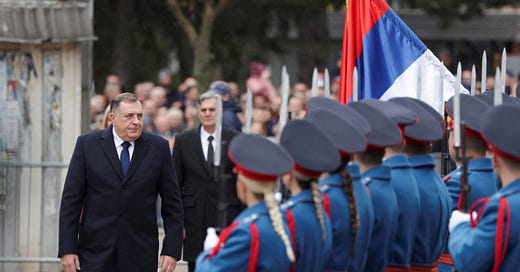S5E17. Republika Srpska is in total chaos
An arrest warrant is pending against Milorad Dodik, President of the Serb entity of Bosnia and Herzegovina, for attempted secession. Increasingly isolated, he has almost no option left
Dear reader,
welcome back to BarBalkans, the newsletter with blurred boundaries.
This is a crisis that has been unfolding for years—perhaps even decades. This crisis has its roots in the very foundations of Bosnia and Herzegovina’s unification project, conceived 30 years ago to end the wars of the 1990s.
Now, those long-standing tensions are erupting into the open.
On one side, the president of Republika Srpska—one of Bosnia’s two entities—is pushing his secessionist agenda to the limit.
On the other, the country’s highest court has issued an arrest warrant against him, while Dodik flew under the guise of an official visit to Israel and Russia.
Republika Srpska is in total chaos. But where it will all lead remains uncertain, casting a long shadow over the future of Bosnia and Herzegovina.
Read and listen to: ‘The Yugoslav Wars’ Podcast
BarBalkans is a newsletter powered by The New Union Post. Your support is essential to ensure the entire editorial project continues producing original content while remaining free and accessible to everyone.
A long-standing crisis
For years, Dodik has pursued a secessionist agenda in the Bosnian-Serb entity, explicitly since at least October 2021.
As leader of the Alliance of Independent Social Democrats (SNSD), he vowed to withdraw Republika Srpska from Bosnia and Herzegovina’s central authority in matters of defence, tax administration, and justice. A year later, he also reclaimed the Presidency of Republika Srpska, further strengthening his push for greater autonomy.
At the heart of this secessionist project is the creation of an independent armed force, along with the suspension of laws issued by the UN High Representative that granted the central government authority over defence and justice.
Read also: S2E14. Why Bosnia is restless
In challenging these legal frameworks, Dodik is questioning the very foundation of the Bosnian State—the Dayton Agreement. Signed in November 1995 under US diplomatic pressure, the agreement brought an end to the civil war that had raged since 1992.
Post-Dayton Bosnia is a multi-ethnic state with significant decentralisation, ensuring a degree of autonomy for its three ‘constituent’ ethnic groups: Serbs, Croats, and Bosniaks (Bosnian Muslims).
One of the most tangible outcomes of this system is the division of Bosnia into two entities, shaped by the territorial boundaries that emerged from the war. The Federation of Bosnia and Herzegovina—primarily home to Bosniaks and Bosnian Croats—and Republika Srpska, which is overwhelmingly Serb.
A pro-Russian nationalist, Bosnian Serb President Dodik introduced a ‘foreign agents’ law in Republika Srpska in 2023, requiring organisations and foundations receiving foreign funding to register. He also reinstated defamation as a criminal offence under the Penal Code, imposing strict penalties on the media.
More significantly, he signed laws nullifying rulings from both the Constitutional Court of Bosnia and the Office of the High Representative. In response, Bosnian prosecutors brought him before the Court in Sarajevo.
On 26 February 2025, the Court of Bosnia and Herzegovina sentenced Dodik to one year in prison and banned him from political office for six years over his separatist actions.
Rather than backing down, Dodik escalated tensions, openly calling for a popular uprising to achieve independence and establish a ‘Greater Serbia’—uniting all territories historically significant to the Serbian people.
Moreover, defying the Court’s ruling, he fled the country, first travelling to Israel via Serbia before heading to Moscow, where on 1 April he met Russian President Vladimir Putin.

Brussels’ perspective
“Dodik has miscalculated every move and has no more cards left to play,” said Czech MEP Ondřej Kolář (EPP), the European Parliament’s rapporteur for Bosnia and Herzegovina, in an interview with BarBalkans.
As he is “merely struggling to stay politically alive,” the President of Republika Srpska now finds himself “increasingly isolated,” even within his own entity, “with almost no stakeholders supporting him apart from his own party.
MEP Kolář is sure that Dodik’s potential arrest is unlikely to trigger a popular uprising. “Even Serbian President Aleksandar Vučić seems ready to abandon him,” not only because supporting him has become “too politically costly,” but also because “Vučić must focus on his own political survival at home.”
Read also: S5E14. Meet the voices of Serbian students
This is why “the only remaining allies are Hungary and Russia,” the Czech MEP noted. Regarding Orbán, “what we see is that he is an advocate of Putin,” as he is doing everything possible to weaken the European Union.
As for Russia, while cyberattacks and hybrid influence are tools Moscow “will continue to use,” it is crucial to note that “they will support him only as long as he remains useful to them.” For example, Dodik has urged Moscow to veto the extension of the EUFOR Althea mission at the UN. However, “the Russians are not so naïve to overlook the fact that if they did this, NATO would step in.”
And then there is another major “miscalculation” made by Dodik. He assumed that the new U.S. administration led by Donald Trump would reject the Dayton Agreement, whereas—“at least for now”—he has not challenged Bosnia’s institutional framework.
However, Kolář warned, “Trump cannot be trusted, he changes his mind every day,” making the White House seem like a wheel of fortune: “Every morning, no one knows what he will say or do.”
This unpredictability has direct consequences for Europe. “The Western Balkans are the priority—we simply cannot afford failure.” As Dodik has “nothing to offer” the people who want to live by European standards, the EU must remain “resolute” when opening accession negotiations with a candidate country, Kolář concluded.
Pit stop. Sittin’ at the BarBalkans
We have reached the end of this piece of the road.
Hoping for a more peaceful future for Bosnia and Herzegovina, our bar, the BarBalkans, makes a stop in Trebinje, in the southernmost part of Republika Srpska.
The region’s winemaking tradition dates back to the earliest Hellenic colonies on the Adriatic coast. Its sub-Mediterranean climate—marked by hot summers and mild winters—provides ideal conditions for the native grape varieties Žilavka and Vranac.
The white grape Žilavka is believed to have originated from vines planted by the ancient Greeks along the Mediterranean coast. The red grape Vranac was introduced during the Austro-Hungarian era.
Nestled in the heart of southern Herzegovina, the Orthodox monastery of Tvrdoš has been renowned for its winemaking since medieval times. Built in the late 13th century on the right bank of the Trebišnjica River, it carries a centuries-old tradition of viticulture.
Within its 16th-century stone-vaulted cellar, Vranac wines age in vast, century-old oak barrels, crafted from the monastery’s surrounding vineyards. Meanwhile, two modern cellars, built in the past two decades, house cutting-edge winemaking and ageing technologies.
Let’s continue BarBalkans journey. We will meet again in two weeks, for the 18th stop of this season.
A big hug and have a good journey!
Behind every original product comes an investment of time, energy and dedication. With your support The New Union Post will be able to elaborate new ideas, articles, and interviews, including within BarBalkans newsletter.
Every second Wednesday of the month you will receive a monthly article-podcast on the Yugoslav Wars, to find out what was happening in the Balkans 30 years ago.
You can listen to the preview of The Yugoslav Wars every month on Spreaker.
Discover Pomegranates, the newsletter on Armenia and Georgia’s European path powered by The New Union Post
If you no longer want to receive all BarBalkans newsletters, you can manage your preferences through Account settings. There is no need to unsubscribe from all the newsletters, just choose the products you prefer!







